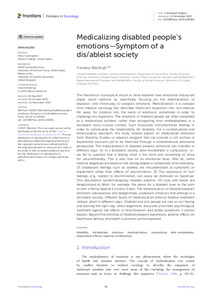| dc.date.accessioned | 2024-02-02T14:15:19Z | |
| dc.date.available | 2024-02-02T14:15:19Z | |
| dc.date.issued | 2023-12-11 | |
| dc.identifier | doi:10.17170/kobra-202402029512 | |
| dc.identifier.uri | http://hdl.handle.net/123456789/15430 | |
| dc.description.sponsorship | Gefördert durch den Publikationsfonds der Universität Kassel | |
| dc.language.iso | eng | |
| dc.rights | Namensnennung 4.0 International | * |
| dc.rights.uri | http://creativecommons.org/licenses/by/4.0/ | * |
| dc.subject | disability | eng |
| dc.subject | dis/ableism | eng |
| dc.subject | emotion | eng |
| dc.subject | medicalization | eng |
| dc.subject | compulsory able-mindedness | eng |
| dc.subject | impairment effects | eng |
| dc.subject | hysteria | eng |
| dc.subject | fetishization | eng |
| dc.subject.ddc | 300 | |
| dc.title | Medicalizing disabled people’s emotions - Symptom of a dis/ableist society | eng |
| dc.type | Aufsatz | |
| dcterms.abstract | The theoretical - conceptual article at hand explores how emotional discourses shape social relations by specifically focusing on the medicalization of disabled - and chronically ill - people's emotions. Medicalization is a concept from medical sociology that describes medicine's expansion into non-medical life areas, for instance into the realm of emotions, sometimes in order to challenge this expansion. The emotions of disabled people are often presented as a medicalized problem, rather than recognizing their embeddedness in a dis/ableist socio-cultural context. Such discourses instrumentalize feelings in order to individualize the responsibility for disability. For a contextualized and emancipatory approach, this study reviews papers on medicalized emotions from Disability Studies - a research program that can provide a rich archive of experiential accounts yet to be theorized through a comprehensive emotional perspective. The medicalization of disabled people's emotions can manifest in different ways: (1) In a dis/ableist society, able-mindedness is compulsory; i.e., we fail to question that a healthy mind is the norm and something to strive for unconditionally. This is also true on an emotional level; after all, some medical diagnoses are based on the wrong degree or temporality of emotionality. (2) Unpleasant feelings such as sadness are misunderstood as symptoms of impairment rather than effects of discrimination. (3) The expression of hurt feelings, e.g., related to discrimination, can easily be dismissed as hysterical. This assumption epistemologically disables patients. (4) Love and desire are delegitimized as fetish, for example, the desire for a disabled lover or the wish to start a family despite a chronic illness. The medicalization of disabled people's emotions individualizes and delegitimizes unpleasant emotions that emerge in a dis/ableist society. Different facets of medicalization enforce medical treatment instead, albeit in different ways. Disabled and sick people are cast as not feeling and desiring the right way, while hegemonic discourse prescribes psychological treatment against the effects of discrimination and bodily symptoms it cannot explain. Beyond the dismissal of disabled people's experience, adverse effects on healthcare delivery and health outcomes can be expected. | eng |
| dcterms.accessRights | open access | |
| dcterms.creator | Wechuli, Yvonne | |
| dcterms.extent | 12 Seiten | |
| dc.relation.doi | doi:10.3389/fsoc.2023.1230361 | |
| dc.subject.swd | Inklusion <Soziologie> | ger |
| dc.subject.swd | Medikalisierung | ger |
| dc.subject.swd | Behinderter Mensch | ger |
| dc.subject.swd | Diskriminierung | ger |
| dc.type.version | publishedVersion | |
| dcterms.source.identifier | eissn:2297-7775 | |
| dcterms.source.journal | Frontiers in Sociology | eng |
| dcterms.source.volume | Volume 8 | |
| kup.iskup | false | |
| dcterms.source.articlenumber | 1230361 | |


